1,000 days later
Unfortunately, the mayor's vision — which feels about 1,000 days too late — is so light on substance that it's hard to see how LA's megaevent future materializes

It was 1,001 days out, technically, when Los Angeles Mayor Karen Bass came to Venice Beach (not Long Beach) to make her big announcement. She was joined by Traci Park, the LA councilmember and former ad hoc committee chair, who is currently trying to kill an affordable housing project a few blocks away by pretending that a city parking lot would be better used as a "mobility hub" during the games. Oddly, no officials from LA28 spoke; Casey and the gang held their own event over the weekend commemorating LA's big 1,000-days-out milestone in... Oklahoma City. Oklahoma City???
The press conference — which you can watch here — was held days after Donald Trump threatened, for the second time, to take the Olympics away from Los Angeles. Bass responded with an overly defensive quote-tweet that the games "are not moving anywhere" and that "empty accusations and falsehoods" would not "distract us from continuing to make meaningful progress." On Friday morning, before Bass held up an official torch (unlit) she shouted — to him? to us? — "We will be ready!"
But will we be ready? Many people are asking. It's been difficult to track "meaningful progress" without an overarching vision articulated by Bass, something I've been demanding since I started this little newsletter 1.5 years ago.
Finally, less than three years out, LA has a vision statement, as well as Executive Directive 16, signed right there on the sand, meant to expedite games-related planning. And here it is:
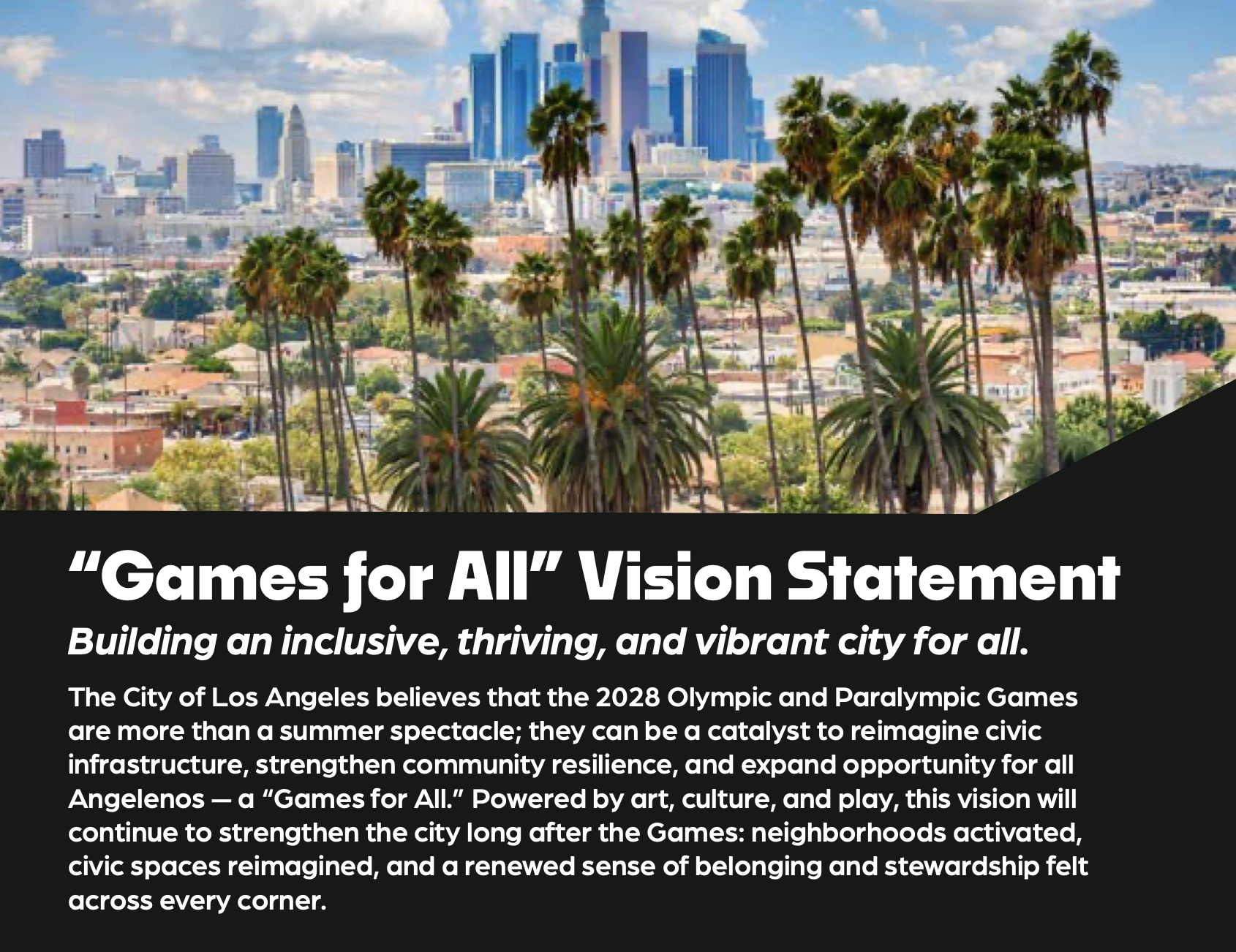
It's an awkward moment for this vision to drop. As we wait to see who's picking up the tab for which city services — the agreement with LA28 is still overdue as of October 1 — our fiscal crisis has intensified. Earlier this month, as reported by Liz Chou — sign up for Liz's new newsletter! — Bass asked most city department managers to trim another 5 percent from their proposed budgets. The reason, according to the letter to managers, is that the city is facing an "extremely challenging budgetary year," in part due to the "need to prepare for major global events such as the World Cup and Olympics."
But if Bass's Games for All vision will "strengthen the city long after the games," wouldn't preparing for these events also be preparing LA for its "inclusive, thriving, and vibrant" future? Unfortunately, the mayor's vision — which feels about 1,000 days too late — is so light on substance that it's hard to see how LA's megaevent future materializes.
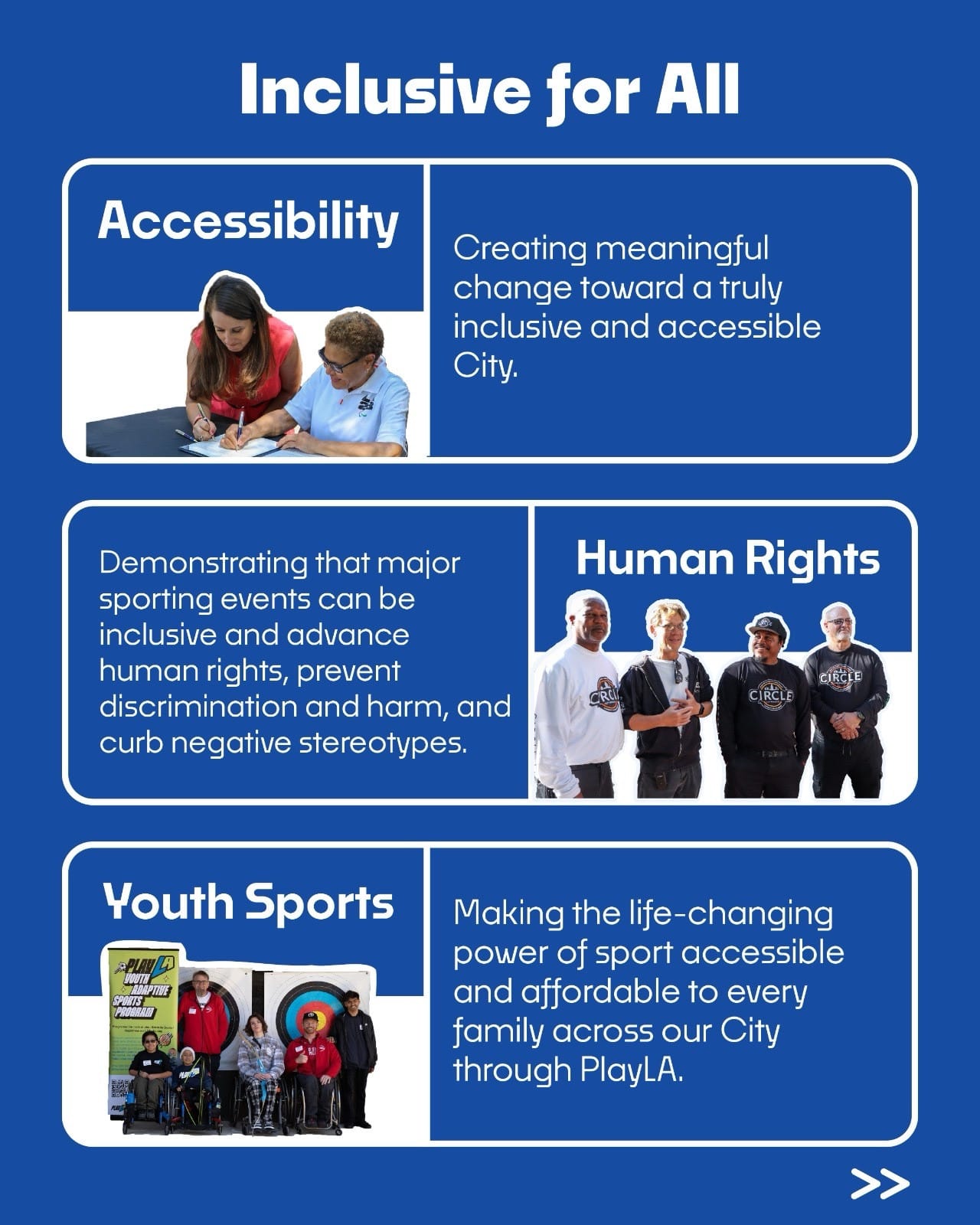
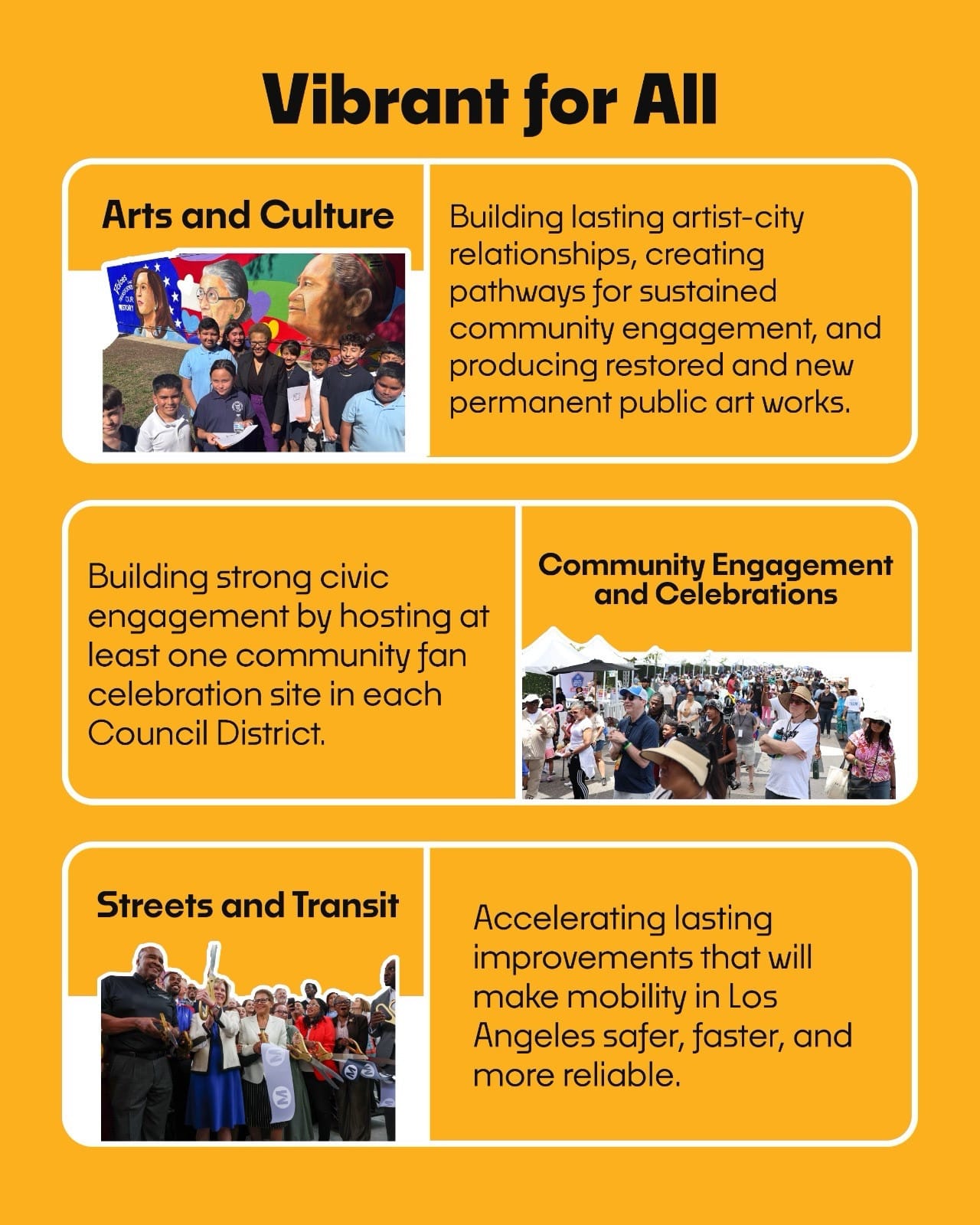
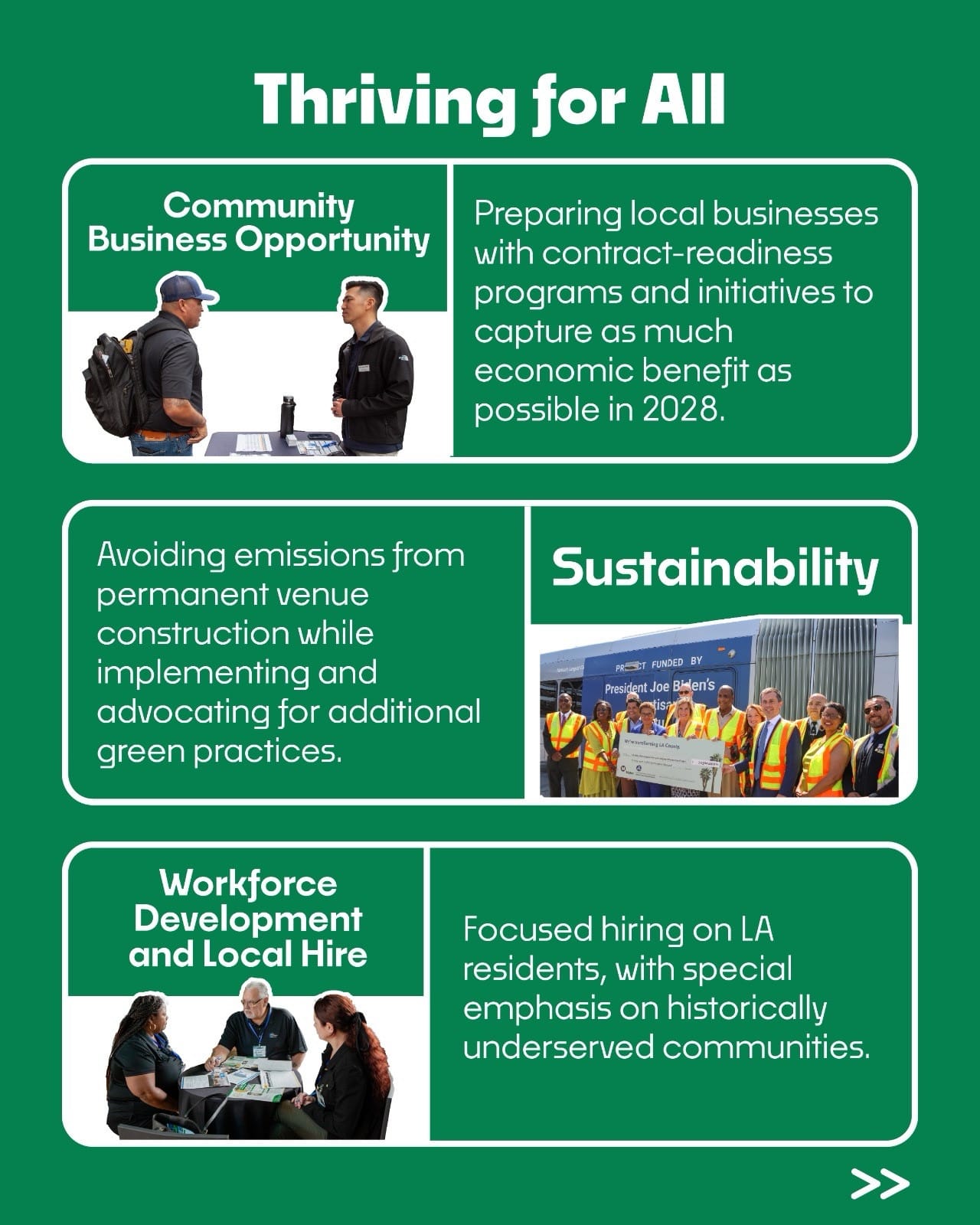
Most of what the Games for All vision promises is actually LA28's responsibility. @mayor.lacity.gov
Of the nine Games for All goals, six are simply reiterations of LA28's required commitments to the city, all of which I reported on in August. One bright spot is LA's cultural program for 2028, with a detailed framework shared to a dedicated webpage (THANK YOU) by the city's Department of Cultural Affairs earlier this month. (LA28’s corresponding Cultural Olympiad Strategic Plan is still nowhere to be seen.) The city has also done a good job positioning local businesses for contracting opportunities — the mayor's annual procurement fair is coming up on Thursday! — but the economic benefit is contingent on tourist spending, which is a huge question mark. It's nice that LA is "committed to continuing" LA28's Play LA youth sports program "well after 2028," but that's not technically a legacy yet. And yes, there will be a human rights strategy because it's something that LA28 must provide to the city by December 31, 2025 — and I can't wait to hear how organizers plan to "deliver a major event in accordance with the highest global human rights standards" when the federal government is kidnapping people off LA's streets.
But with less than three years to go, I was hoping for some goals beyond those outlined in the games agreement. And this vision really struggles to articulate tangible benefits for the city. Take, for example, this plan for creating community celebration zones for Angelenos who don't have tickets to events:
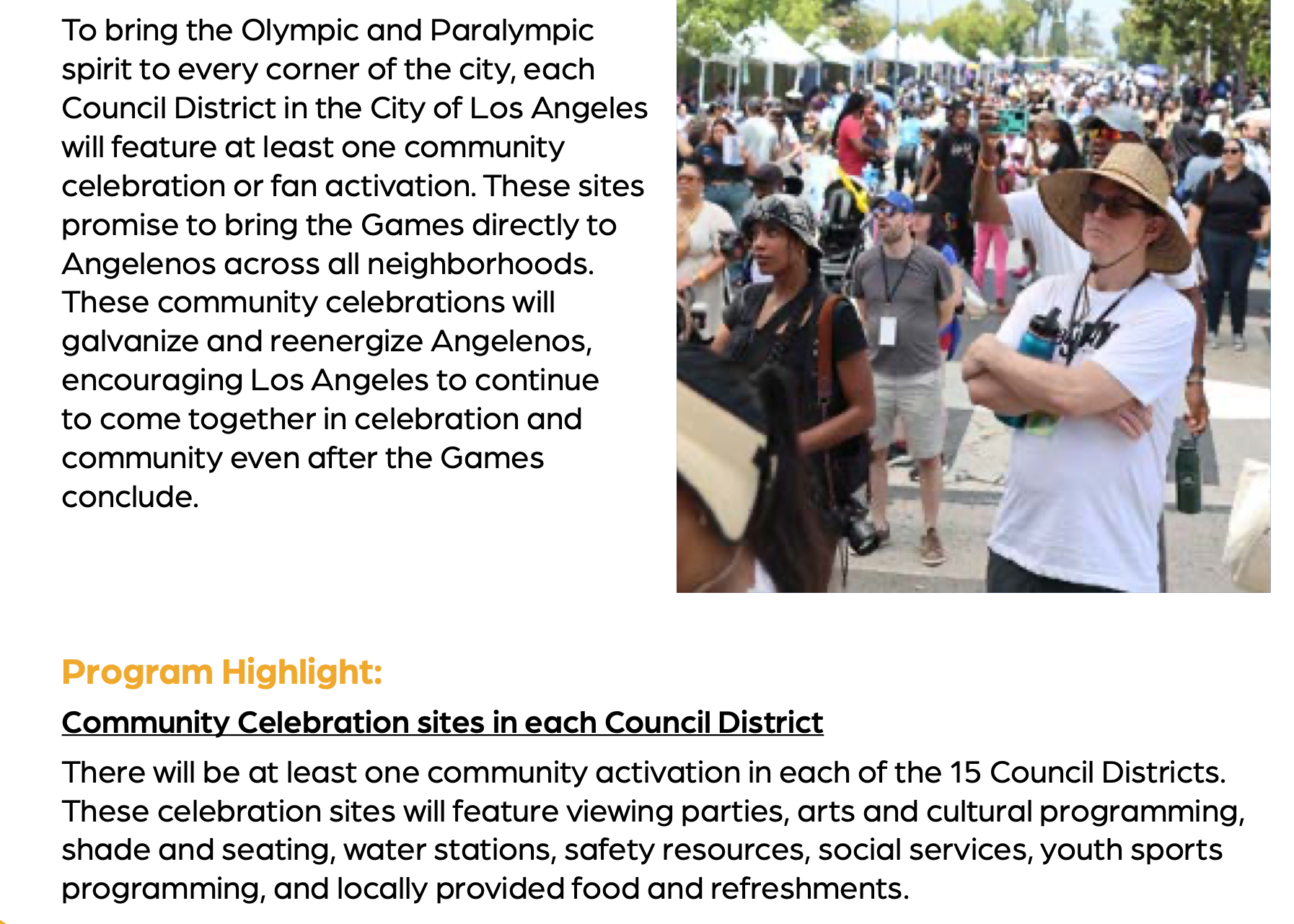
ONE? PER COUNCIL DISTRICT? I know, it does say "at least," but that's what we're currently planning for? 15 activations? This number is clearly derived from Paris, which sited one official celebration zone per arrondissement, with 180 total across France. But that's 20 sites for a 41-square-mile city compared to 15 sites for a 500-square-mile city! If we're truly planning "across all neighborhoods," how about at least one community celebration in each of LA's 99 neighborhood council districts?
LA is lagging far behind other LA County cities, which are busy planning their celebration zones and booking additional activations in the form of hospitality houses. New Zealand, for example, just inked a deal to take over Culver City's downtown in 2028. At the tail end of ED 16, Bass directs city departments to create an inventory of available properties. Are you kidding? This should have been done years ago! Talk to officials at smaller cities — Santa Monica, West Hollywood, Long Beach — and they'll tell you how they're already leveraging these investments from a long list of interested countries into permanent benefits for their residents. LA's inability to maintain and market its civic spaces means we've already lost out.
Which makes it all the more frustrating that public assets like streets and sidewalks — the one thing that the city can fully control and improve! — are buried in this jumble of word salad at the end:
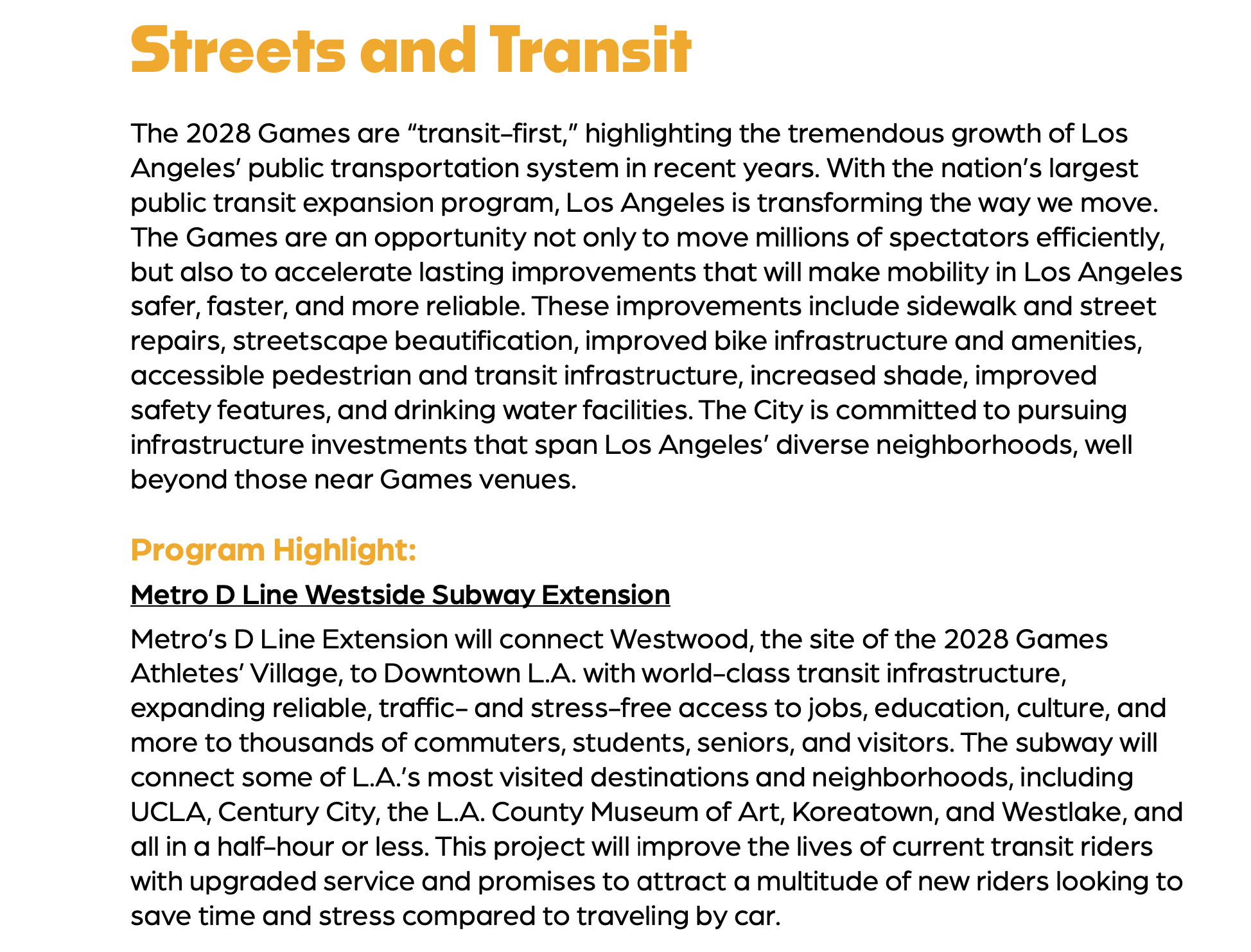
First of all, the transportation project highlighted is Metro's D line extension, which the city has absolutely nothing to do with. Why not promote the completion of our own city-managed transportation project, the LAX people mover! (Maybe because they're not sure it will be completed by 2028.) But with millions of people needing to move around the region safely, it's disheartening to see such important megaevent elements, if not the most important megaevent elements, reduced to an afterthought. If only there was, say, a thoughtful proposal for multimodal car-free corridors connecting most of the venues that the city could simply endorse! Hypothetically, of course!
With current street safety projects taking 1,000 days or more — and good luck getting a sidewalk repaired... ever! — ED 16 does have some ideas for helping to move these processes along. Two weeks ago, the council voted to establish a draft ordinance that would streamline approvals and zoning exemptions for games-related projects. As Torched readers know, this ordinance is mostly about temporary megaevent structures but it could be used to speed up important permanent projects as well. (BATHROOMS.) ED 16 also has recommendations to create expedited permitting processes and let architects self-certify plans, which have proved popular for fire recovery. Why not extend these to the city's beleaguered restaurant industry and start the process of opening more pop-up cafes, coffee kiosks, and beer gardens now so they'll be in place for the next three summers!
But with a budget crunch and a time crunch, how does the city decide which projects move to the top of the list — without sacrificing much-needed improvements elsewhere? One year and seven executive directives ago, Bass's ED 9 established a new capital infrastructure planning process across city departments. The first capital plan, which officials are calling the Games CIP, was set to release a set of prioritization metrics and a list of citywide prioritized projects by November 2025. A capital plan is essential for equity, especially if a city hosting the largest-ever Paralympics wants to make accessibility one of the Games for All goals. Sure, there are other lists of projects that the city is prioritizing for 2028 — including, ahem, a certain $2.7 billion one — but why is the Games CIP not mentioned anywhere in this vision or ED 16?
If the mayor wants to see this all come to pass, she's got an election to win first. Focusing on timely project delivery seems like an ideal campaign promise. If the Olympics and Paralympics represent an "opportunity to build infrastructure that creates a greener Los Angeles, a Los Angeles that is easier to get around, and a Los Angeles where all residents are more connected to one another," let's list the tangible benefits that Angelenos will be able to experience — on a dedicated webpage, I'm begging you here! — and start ticking them off one-by-one. Sounds like a political slam dunk for someone running for reelection in an increasingly crowded field. 🔥
⛱️ Coming up this Saturday, October 25 from 11 a.m. to 4 p.m., the Festival Trail will be popping up at the Music Center with a new shade structure prototype. From 1 to 2 p.m. there will be a panel on megaevent preparation with local officials including Councilmember Nithya Raman. There will also be a dance performance, public art, and a tree giveaway. All details here, but if you miss it, the structure will be up until November 1, then traveling around the county
🗓️ And on Wednesday, October 29, Karen Bass and her Office of Major Events executive director Paul Krekorian will brief LA's 99 neighborhood councils on the plans for the Olympic and Paralympic Games. (A meeting that was originally scheduled for July.) This is a very good time to reach out to your local elected officials and give them your questions about what you want to see in your neighborhood. Here's how to find your neighborhood council representatives
📕 Finally, I’m so honored to have the very first piece I published at Torched, an interview with Deborah Sussman, featured in the new book The Education of a Design Writer, edited by Steven Heller and Molly Heintz. When Deborah spoke about her work on the 1984 Summer Olympics she radiated an intensity beyond her usual passion for design — you could feel both her deep love for this city and her insistence that LA was capable of achieving so much more. As I write about 2028, I see her spirit in the visionaries who are forging ahead with their own plans to bring the region together despite the uninspired leadership holding us back





